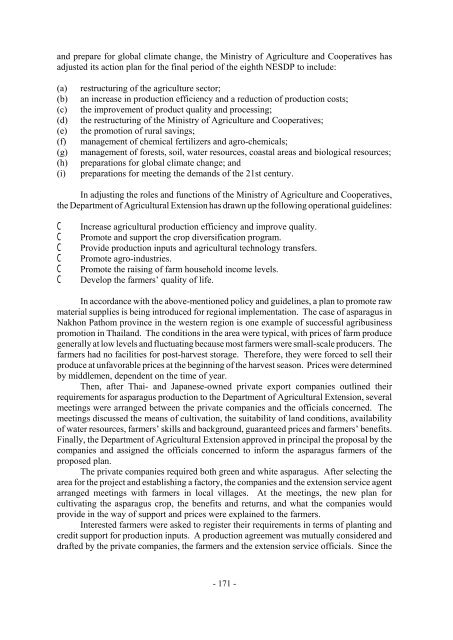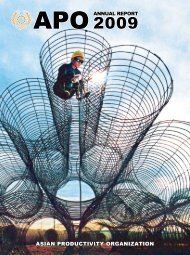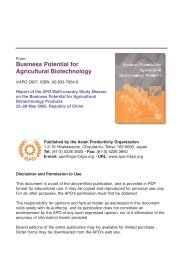Development of Agribusiness Enterprises - Asian Productivity ...
Development of Agribusiness Enterprises - Asian Productivity ...
Development of Agribusiness Enterprises - Asian Productivity ...
Create successful ePaper yourself
Turn your PDF publications into a flip-book with our unique Google optimized e-Paper software.
and prepare for global climate change, the Ministry <strong>of</strong> Agriculture and Cooperatives has<br />
adjusted its action plan for the final period <strong>of</strong> the eighth NESDP to include:<br />
(a) restructuring <strong>of</strong> the agriculture sector;<br />
(b) an increase in production efficiency and a reduction <strong>of</strong> production costs;<br />
(c) the improvement <strong>of</strong> product quality and processing;<br />
(d) the restructuring <strong>of</strong> the Ministry <strong>of</strong> Agriculture and Cooperatives;<br />
(e) the promotion <strong>of</strong> rural savings;<br />
(f) management <strong>of</strong> chemical fertilizers and agro-chemicals;<br />
(g) management <strong>of</strong> forests, soil, water resources, coastal areas and biological resources;<br />
(h) preparations for global climate change; and<br />
(i) preparations for meeting the demands <strong>of</strong> the 21st century.<br />
In adjusting the roles and functions <strong>of</strong> the Ministry <strong>of</strong> Agriculture and Cooperatives,<br />
the Department <strong>of</strong> Agricultural Extension has drawn up the following operational guidelines:<br />
C Increase agricultural production efficiency and improve quality.<br />
C Promote and support the crop diversification program.<br />
C Provide production inputs and agricultural technology transfers.<br />
C Promote agro-industries.<br />
C Promote the raising <strong>of</strong> farm household income levels.<br />
C Develop the farmers’ quality <strong>of</strong> life.<br />
In accordance with the above-mentioned policy and guidelines, a plan to promote raw<br />
material supplies is being introduced for regional implementation. The case <strong>of</strong> asparagus in<br />
Nakhon Pathom province in the western region is one example <strong>of</strong> successful agribusiness<br />
promotion in Thailand. The conditions in the area were typical, with prices <strong>of</strong> farm produce<br />
generally at low levels and fluctuating because most farmers were small-scale producers. The<br />
farmers had no facilities for post-harvest storage. Therefore, they were forced to sell their<br />
produce at unfavorable prices at the beginning <strong>of</strong> the harvest season. Prices were determined<br />
by middlemen, dependent on the time <strong>of</strong> year.<br />
Then, after Thai- and Japanese-owned private export companies outlined their<br />
requirements for asparagus production to the Department <strong>of</strong> Agricultural Extension, several<br />
meetings were arranged between the private companies and the <strong>of</strong>ficials concerned. The<br />
meetings discussed the means <strong>of</strong> cultivation, the suitability <strong>of</strong> land conditions, availability<br />
<strong>of</strong> water resources, farmers’ skills and background, guaranteed prices and farmers’ benefits.<br />
Finally, the Department <strong>of</strong> Agricultural Extension approved in principal the proposal by the<br />
companies and assigned the <strong>of</strong>ficials concerned to inform the asparagus farmers <strong>of</strong> the<br />
proposed plan.<br />
The private companies required both green and white asparagus. After selecting the<br />
area for the project and establishing a factory, the companies and the extension service agent<br />
arranged meetings with farmers in local villages. At the meetings, the new plan for<br />
cultivating the asparagus crop, the benefits and returns, and what the companies would<br />
provide in the way <strong>of</strong> support and prices were explained to the farmers.<br />
Interested farmers were asked to register their requirements in terms <strong>of</strong> planting and<br />
credit support for production inputs. A production agreement was mutually considered and<br />
drafted by the private companies, the farmers and the extension service <strong>of</strong>ficials. Since the<br />
- 171 -
















